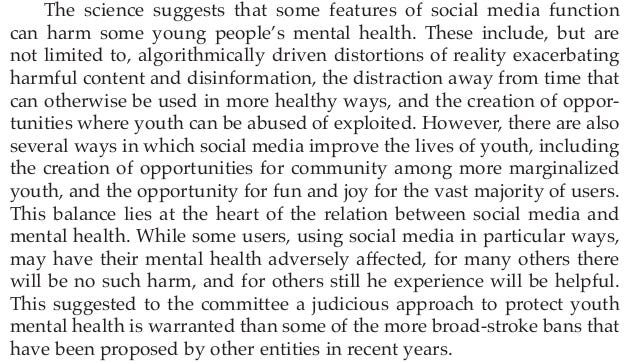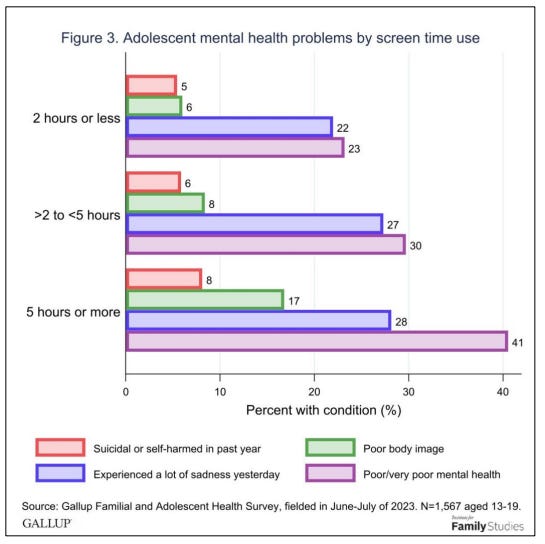Illusory Balance: How National Academies Trivialize Serious Risks Associated with Social Media
The report by the Committee on the Impact of Social Media on Adolescent Health uses factors like 'fun' and 'community' to offset harms such as depression, suicide, and sexual abuse.
We have seen previously that the National Academies report titled Social Media and Adolescent Health severely misinforms, misleads and misdirects readers in its attack on concerns over adolescent mental health deterioration and that its author, the Committee on the Impact of Social Media on Adolescent Health, reveals its primary concern to be corporate welfare rather than adolescent well-being.
We will now see that the Preface to the report misleads readers in yet another matter: that of net effects of social media on mental health.
Imaginary Balance
The preface to the report, written by the committee chair Sandro Galea, contains the following section:
The assertion “This balance lies at the heart of the relation between social media and mental health” itself lies at the heart of the short Preface and is used to justify its primary message: the rejection of “broad-stroke bans”.
This assertion of balance, however, has no foundation in evidence or, for that matter, reality.
The very notion that ‘fun’ and ‘community’ offset mental health harms resulting from the risks listed above is implausible. The potential harms include exposure of vulnerable kids to suicide and eating disorders indoctrination; massive public shaming or embarrassment that can last indefinitely; and sexual exploitation online by adult strangers — experiences likely to have severe effects on the mental health of kids. Furthermore, these particular risks can be considerably mitigated if minors have no access to most social media (broad-stroke bans).1
Statistical evidence also contradicts the notion of a balance at population level: key indicators of mental health among kids, such as anxiety, depression, and suicidal conduct, are strongly associated with frequent social media use, so much so that heavy users have double or more the risks of moderate users (see Social Media and Mental Health Collaborative Review).
See also one of the latest results on SM/MH associations from Gallup 2023 data:
Time spent on social media predicts significantly lower mental health and higher discomfort with one’s body in simple models adjusting only for child sex and age. Teens who spend more than 5 hours a day on social media were 2.5 times more likely to express suicidal thoughts or harm themselves, 2.4 times more likely to hold a negative view of their body, and 40% more likely to report a lot of sadness the day before. [p. 3 of an IFS & Gallup study]
On the other hand the positive effects of social media ‘fun’ on mental health are questionable, especially given that most of the ‘fun’ is largely similar to the corporate entertainment (such as movies and music videos and gaming) that already saturates adolescent environments — more so perhaps than at any other time in human history.
Indeed the sheer amounts of time spent by teens on online entertainment is precisely one of the plausible explanations of declines in mental health, as it is displacing other crucial activities, such as direct interactions with friends and, for some, even sleep.
Furthermore, the massive amounts of time spent by adolescents on social media may be even affecting the mental health of kids who spend little time online but whose social lives are diminished due to fewer opportunities to interact with their peers offline.
It is therefore no surprise that the report fails to even attempt to justify the notion that there is a ‘balance’ — its existence is simply declared to be so by Galea.
As to online ‘communities’ for socially isolated adolescents, the report provides little evidence that the overall effect of social media on such teens is truly positive — but even if it is, then it could continue to be so even if teens are allowed to access only social media where content is moderated to be age-appropriate and where time limits on minors are being enforced.
Note that my criticism is not meant as an argument that broad-stroke bans are necessary — there are various reasons why such legislation could be ineffective or harmful even if current social media use is overall substantially detrimental to most teens.2
It is inexcusable, however, for a Preface to a National Academies report to be severely misleading by promoting an argument that is implausible and based on imaginary ‘balance’ that contains no support in the evidence provided by the report itself.
Update March 2: Added Figure 3 and a quote from a 2023 IFS & Gallup study.
Note also that broad-stroke bans could still allow access by kids to social media that obeys certain sets of rules, such as content moderation designed to be age-appropriate and the enforcement of time limits for minors.
One concern is that preventing active participation on social media will not dent the massive amounts of time teens spend using it passively, such as by watching YouTube and Tik Tok videos. Another concern is that preventing illegitimate contacts with strangers may require banning kids from using all communications utilities, even Skype or Zoom or email. Yet another concern is that over-protection online could just embolden potential harms caused by over-protections of kids offline. As to enforcement, there are concerns that mandatory age verification would undermine free speech. And so on.






How do you explain the CDC's 2021 survey numbers clearly showing teens who use social media heavily (4+ hours per day) are 29% LESS likely to attempt suicide, and 31% LESS likely to be injured in a suicide attempt, than teens who use social media sparingly (<1 hour per day) or not at all?
Standard multivariate analysis of the CDC survey shows teens who suffer the most violent and/or emotional abuses by parents/household adults are 6 times more likely to be depressed, 7 times more likely to be bullied (at much lower levels) online or at school, and 25 times more likely to attempt suicide than non-abused teens. Parent-abused LGBQ teens who use social media are 43% LESS likely to attempt suicide than LGBQ teens who rarely or never use social media.
Social media use is associated with a trivial 1% of teens’ depression (probably a reverse correlation, since depressed teens go online much more to get help), while parental abuses are associated with 13 times more teenage depression. Imagine if the CDC added survey questions on parents’ drug/alcohol abuse, sexual abuses, mental health troubles, and suicidal behaviors.
I invite those who find these points unbelievable to download and analyze the CDC survey yourselves, as well as the Pew survey – something almost no one seems to have done. The large majority of teens benefit from social media use, and the small fraction with problems also suffer serious troubles in other venues. Should we ban teens from church, Boy Scouts, school, athletics, youth programs, being with parents and adult relatives, etc., all associated with far more abuse and mental health damage than anything attributable to social media?
Pro-corporate bias aside, I still think that balance is important to this debate. The illberal hysteria by the zealots needs to be countered by something, after all.
I must say I am a bit disappointed in you lately, David. Until recently, you were a great corrective and foil to Jon Haidt, and provided excellent criticism, but now you seem to be converging towards his POV. Thus on Substack, Mike Males (and myself) remains the lone dissenter voice in the ever-growing wilderness.
Broad stroke bans are NOT the answer. Not only do they throw out the baby with the bathwater, but they are also far too downstream to actually solve any problem. What we need is the Electronic Frontier Foundation's idea of Privacy First. That is, comprehensive data privacy legislation for all ages that bans surveillance advertising, before we even consider doing anything more heavy-handed. That is, force Big Tech to go on the DuckDuckGo model, which will disincentivize nearly all of their dark side.
(I am clearly NO friend of Big Tech by any stretch of the imagination, even if occasionally a proverbial stopped clock may be right twice a day. And Big Tech would HATE with the EFF proposes, as that would throw their proverbial One Ring into the fires of Mount Doom for good.)
Big Tech can go EFF off!